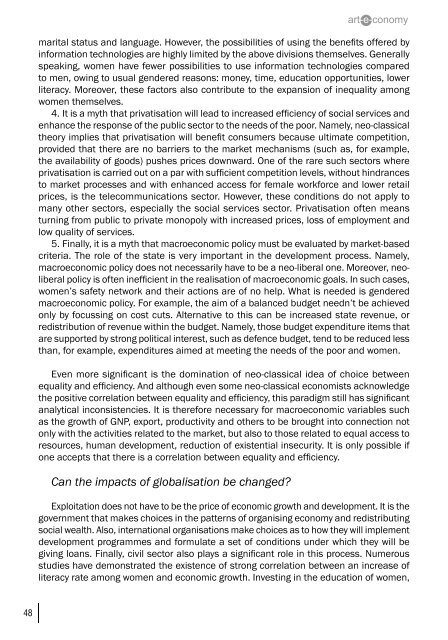art-e-conomy _ reader - marko stamenkovic
art-e-conomy _ reader - marko stamenkovic
art-e-conomy _ reader - marko stamenkovic
Create successful ePaper yourself
Turn your PDF publications into a flip-book with our unique Google optimized e-Paper software.
48<br />
marital status and language. However, the possibilities of using the benefits offered by<br />
information technologies are highly limited by the above divisions themselves. Generally<br />
speaking, women have fewer possibilities to use information technologies compared<br />
to men, owing to usual gendered reasons: money, time, education opportunities, lower<br />
literacy. Moreover, these factors also contribute to the expansion of inequality among<br />
women themselves.<br />
4. It is a myth that privatisation will lead to increased efficiency of social services and<br />
enhance the response of the public sector to the needs of the poor. Namely, neo-classical<br />
theory implies that privatisation will benefit consumers because ultimate competition,<br />
provided that there are no barriers to the market mechanisms (such as, for example,<br />
the availability of goods) pushes prices downward. One of the rare such sectors where<br />
privatisation is carried out on a par with sufficient competition levels, without hindrances<br />
to market processes and with enhanced access for female workforce and lower retail<br />
prices, is the telecommunications sector. However, these conditions do not apply to<br />
many other sectors, especially the social services sector. Privatisation often means<br />
turning from public to private monopoly with increased prices, loss of employment and<br />
low quality of services.<br />
5. Finally, it is a myth that macroeconomic policy must be evaluated by market-based<br />
criteria. The role of the state is very important in the development process. Namely,<br />
macroeconomic policy does not necessarily have to be a neo-liberal one. Moreover, neoliberal<br />
policy is often inefficient in the realisation of macroeconomic goals. In such cases,<br />
women’s safety network and their actions are of no help. What is needed is gendered<br />
macroeconomic policy. For example, the aim of a balanced budget needn’t be achieved<br />
only by focussing on cost cuts. Alternative to this can be increased state revenue, or<br />
redistribution of revenue within the budget. Namely, those budget expenditure items that<br />
are supported by strong political interest, such as defence budget, tend to be reduced less<br />
than, for example, expenditures aimed at meeting the needs of the poor and women.<br />
Even more significant is the domination of neo-classical idea of choice between<br />
equality and efficiency. And although even some neo-classical economists acknowledge<br />
the positive correlation between equality and efficiency, this paradigm still has significant<br />
analytical inconsistencies. It is therefore necessary for macroeconomic variables such<br />
as the growth of GNP, export, productivity and others to be brought into connection not<br />
only with the activities related to the market, but also to those related to equal access to<br />
resources, human development, reduction of existential insecurity. It is only possible if<br />
one accepts that there is a correlation between equality and efficiency.<br />
Can the impacts of globalisation be changed?<br />
Exploitation does not have to be the price of economic growth and development. It is the<br />
government that makes choices in the patterns of organising e<strong>conomy</strong> and redistributing<br />
social wealth. Also, international organisations make choices as to how they will implement<br />
development programmes and formulate a set of conditions under which they will be<br />
giving loans. Finally, civil sector also plays a significant role in this process. Numerous<br />
studies have demonstrated the existence of strong correlation between an increase of<br />
literacy rate among women and economic growth. Investing in the education of women,


